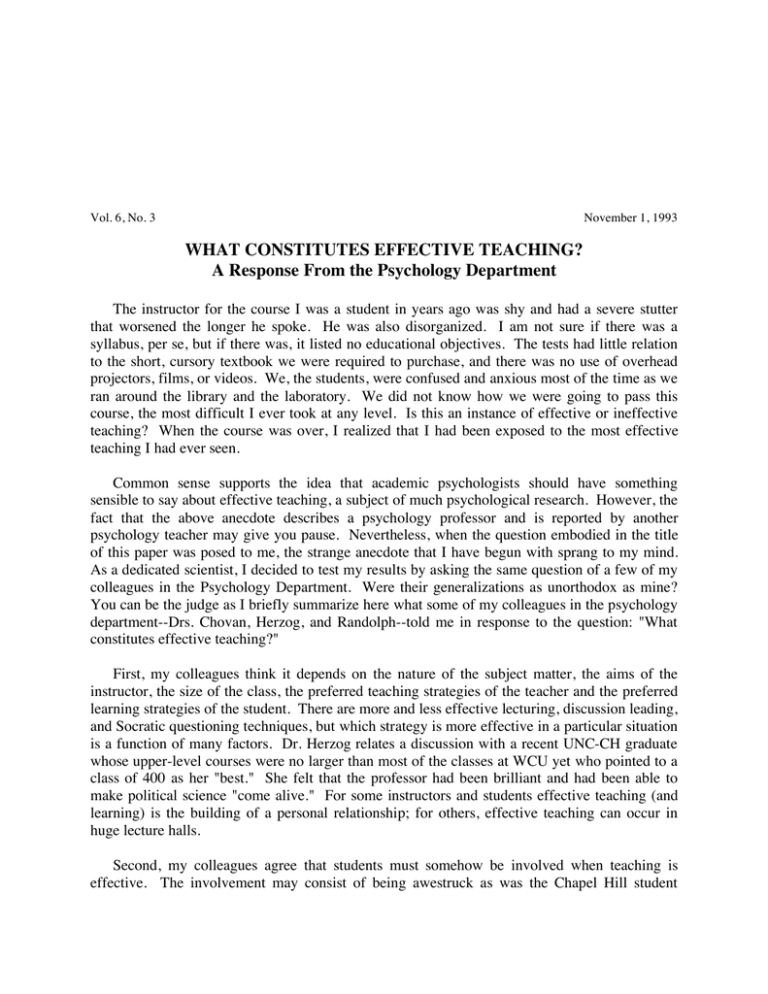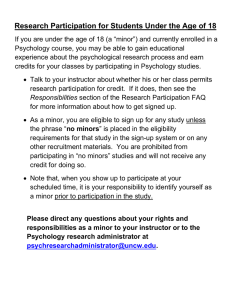WHAT CONSTITUTES EFFECTIVE TEACHING? A Response From the Psychology Department
advertisement

Vol. 6, No. 3 November 1, 1993 WHAT CONSTITUTES EFFECTIVE TEACHING? A Response From the Psychology Department The instructor for the course I was a student in years ago was shy and had a severe stutter that worsened the longer he spoke. He was also disorganized. I am not sure if there was a syllabus, per se, but if there was, it listed no educational objectives. The tests had little relation to the short, cursory textbook we were required to purchase, and there was no use of overhead projectors, films, or videos. We, the students, were confused and anxious most of the time as we ran around the library and the laboratory. We did not know how we were going to pass this course, the most difficult I ever took at any level. Is this an instance of effective or ineffective teaching? When the course was over, I realized that I had been exposed to the most effective teaching I had ever seen. Common sense supports the idea that academic psychologists should have something sensible to say about effective teaching, a subject of much psychological research. However, the fact that the above anecdote describes a psychology professor and is reported by another psychology teacher may give you pause. Nevertheless, when the question embodied in the title of this paper was posed to me, the strange anecdote that I have begun with sprang to my mind. As a dedicated scientist, I decided to test my results by asking the same question of a few of my colleagues in the Psychology Department. Were their generalizations as unorthodox as mine? You can be the judge as I briefly summarize here what some of my colleagues in the psychology department--Drs. Chovan, Herzog, and Randolph--told me in response to the question: "What constitutes effective teaching?" First, my colleagues think it depends on the nature of the subject matter, the aims of the instructor, the size of the class, the preferred teaching strategies of the teacher and the preferred learning strategies of the student. There are more and less effective lecturing, discussion leading, and Socratic questioning techniques, but which strategy is more effective in a particular situation is a function of many factors. Dr. Herzog relates a discussion with a recent UNC-CH graduate whose upper-level courses were no larger than most of the classes at WCU yet who pointed to a class of 400 as her "best." She felt that the professor had been brilliant and had been able to make political science "come alive." For some instructors and students effective teaching (and learning) is the building of a personal relationship; for others, effective teaching can occur in huge lecture halls. Second, my colleagues agree that students must somehow be involved when teaching is effective. The involvement may consist of being awestruck as was the Chapel Hill student mentioned above, or the involvement may occur through the "hypothetical learning" that Dr. Randolph uses in her classes by posing cases for students to analyze and apply theoretical principles to during class discussions. She believes such techniques make the learning process fun as well as worthwhile. Third, my colleagues agree that effective teaching must take into consideration where the student's starting point is. As Dr Chovan puts it, it is unlikely "that the same teaching strategy is always appropriate for each university student at every point in her/his educational development." Dr. Randolph emphasizes that meeting the students where they can learn best involves using language and examples they can understand and apply. Finally, and perhaps most importantly, all my colleagues agree that effective teaching is teaching that results in learning. Could it be that anything that leads to effective learning is effective teaching? What of the awful situation I described as effective teaching in the first paragraph? How could a course that violates all the standards suggested by modern teacher evaluation instruments be effective? My response is that I learned. I learned a lot, and I learned a lot of things that are important to the education of a psychologist. I learned to think better, to write better, to deal with my peers better, and most of all, I learned how to learn, independent of the instructor. This teacher did not make "effective" presentations, lay out clear objectives, or even guide class discussions. What he did do was to create the conditions for learning to occur. He provided guidance, but not too much guidance, through the way he structured assignments, asked good questions, helped us with resources for hands-on experiences, and provided feedback when necessary. What would have been the outcome of student evaluations on a standard instrument? Probably a very long AFE meeting with his department head. Perhaps more so than my colleagues, I think that an important point made by this example is that when we think of effective teaching, too frequently we are thinking about the presentation made by the instructor in front of a classroom of students. That is what is emphasized in the standard instructor evaluation instrument. With organized, erudite, enthusiastic presentations, we may be able to impress students in the classroom. With well thought-out Socratic questioning, we may be able to get them to talk and think for the few minutes they are actually with us. With well-conceived and multi-media demonstrations, we even may be able to provide some information that will stick longer than the time between presentation and test. However, the long-term learning of the students may depend much more on how we "trap" them into reading, writing, thinking, and learning to learn outside our classrooms, independent of the inthe-classroom behavior of the instructor. Success in doing so may constitute the most effective teaching of all. Bruce Henderson, Psychology • • • • • • • •Editor's Call for Responses• • • • • • • • If you would like to respond to this opinion piece, please send your comments by the 8th of the month to the FCTE. If possible, send to TNienhuis by VAX or by WP Mail. Please indicate whether you are willing to be quoted or prefer to remain anonymous.


